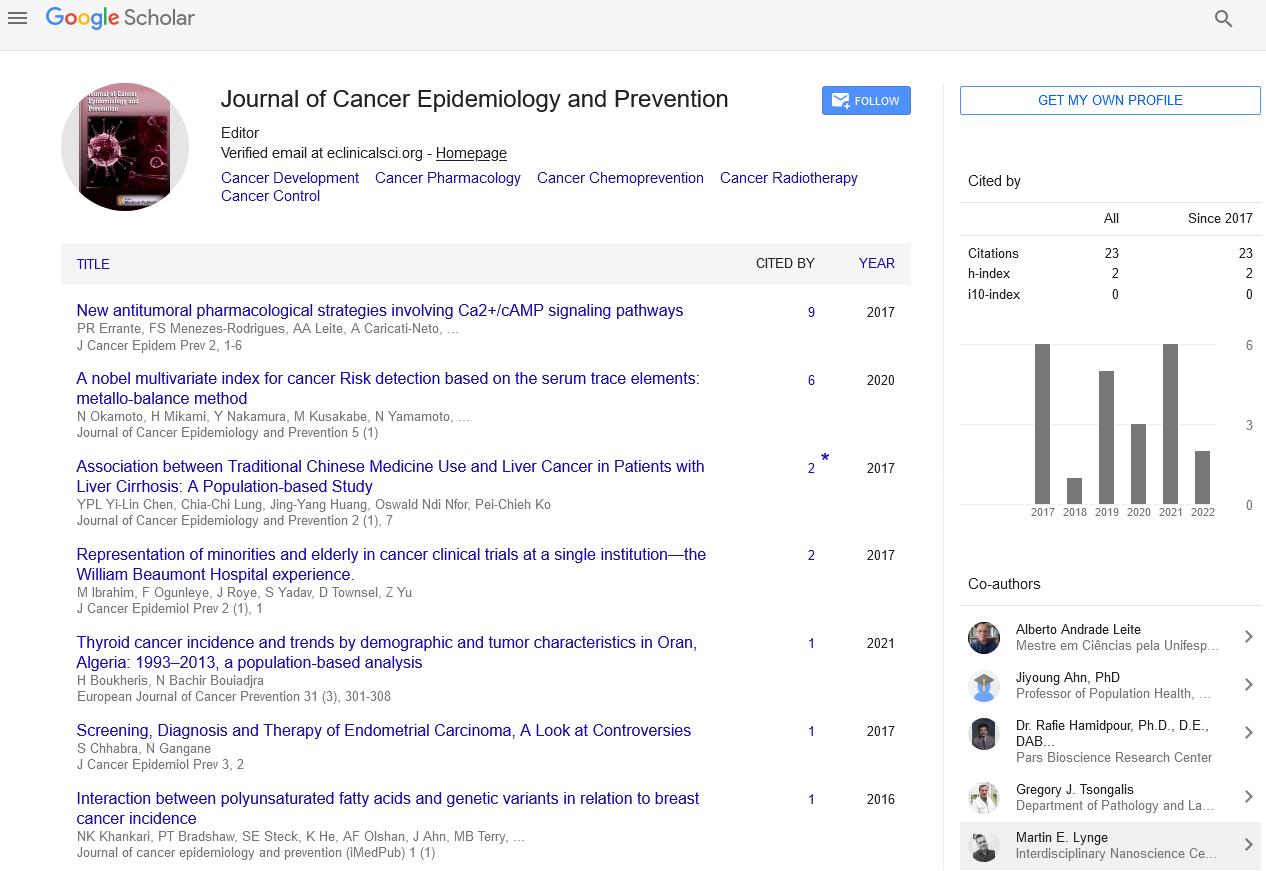Commentary - (2024) Volume 9, Issue 2
Genetic Predisposition: Unraveling the Role of Genes in Health and Disease
Thomas Miller*
Department of Medical Epidemiology, Karolinska Institute, Sweden
*Correspondence:
Thomas Miller,
Department of Medical Epidemiology, Karolinska Institute,
Sweden,
Email:
Received: 29-May-2024, Manuscript No. IPJCEP-24-20847;
Editor assigned: 31-May-2024, Pre QC No. IPJCEP-24-20847 (PQ);
Reviewed: 14-Jun-2024, QC No. IPJCEP-24-20847;
Revised: 19-Jun-2024, Manuscript No. IPJCEP-24-20847 (R);
Published:
26-Jun-2024, DOI: 10.36648/IPJCEP.9.2.15
Description
In the intricate tapestry of human health, genetics serves as
both a blueprint and a storyteller. Our genes, inherited from
ancestors and passed down through generations, encode the
essence of who we are and influence our susceptibility to
various diseases and conditions. This phenomenon, known as
genetic predisposition, has garnered increasing attention in
biomedical research and clinical practice. Understanding genetic
predisposition not only illuminates the complexities of human
biology but also holds profound implications for personalized
medicine, disease prevention, and healthcare delivery. At the
core of genetic predisposition lies the fundamental concept
of genetic variation. Human DNA, composed of approximately
3 billion base pairs, harbours a myriad of variations Single
Nucleotide Polymorphisms (SNPs), insertions, deletions, and
structural changes-that distinguish one individual from another.
These variations contribute to the diversity observed in human
traits, from eye colour to susceptibility to diseases. The Human
Genome Project, completed in 2003, stands as a monumental
achievement in deciphering the human genetic code. It provided
a comprehensive map of our DNA, identifying approximately
20,000-25,000 genes that encode proteins crucial for cellular
function. Beyond protein-coding regions, researchers discovered
regulatory elements and non-coding RNAs that play pivotal roles
in gene expression and regulation. The genomic era unleashed
a wave of discoveries, linking specific genetic variants to various
traits and diseases. For instance, mutations in the BRCA1 and
BRCA2 genes confer a significantly increased risk of breast and
ovarian cancers, illustrating how genetic predisposition can
profoundly impact health outcomes. Genetic predisposition
manifests in multifaceted ways across different diseases and
conditions. Some traits and diseases exhibit a simple Mendelian
inheritance pattern, where a single gene mutation dictates the
presence or absence of a trait. Examples include cystic fibrosis
and sickle cell anaemia, where inheriting two copies of the
mutated gene leads to the disease phenotype. However, many
common diseases, such as diabetes, cardiovascular diseases,
and cancer, arise from complex interactions between multiple
genetic variants and environmental factors. This polygenic nature
complicates the identification of specific genetic contributors
and underscores the need for large-scale genomic studies to
unravel these complexities. Genetic testing has revolutionized
risk assessment by enabling individuals to understand their
genetic predispositions to certain diseases. Direct-to-consumer
genetic testing services offer insights into ancestry and
health traits, empowering individuals with information about
their genetic risks for conditions like Alzheimer’s disease,
Parkinson’s disease, and cardiovascular disorders. These tests
analyse specific genetic variants associated with increased
susceptibility, providing probabilistic assessments of disease
risk. However, interpreting these results requires careful
consideration of genetic counselling and the limitations of
current scientific knowledge regarding gene-environment
interactions. The era of personalized medicine capitalizes on
genetic predisposition to tailor treatment strategies to individual
patients. Pharmacogenomics, for example, examines how
genetic variations influence drug metabolism and response. By
analysing an individual’s genetic profile, clinicians can optimize
medication selection and dosing, enhancing treatment efficacy
while minimizing adverse effects. Additionally, genetic profiling
informs precision oncology approaches, guiding the selection
of targeted therapies based on the genetic mutations driving
a patient’s cancer. This paradigm shift from a one-size-fits-all
approach to a personalized therapeutic strategy represents a
pivotal advancement in modern healthcare.
Acknowledgement
None.
Conflict Of Interest
The author’s declared that they have no conflict of interest.
Citation: Miller T (2024) Genetic Predisposition: Unravelling the Role of Genes in Health and Disease. J Cancer Epidemiol Prev. 9:15.
Copyright: © 2024 Miller T. This is an open-access article distributed under the terms of the Creative Commons Attribution License, which permits unrestricted use, distribution, and reproduction in any medium, provided the original author and source are credited.

